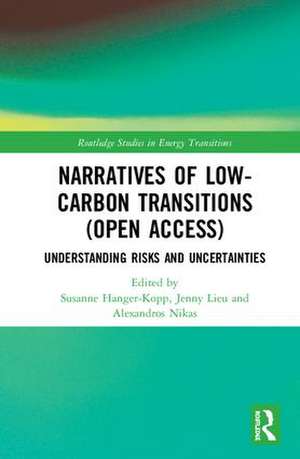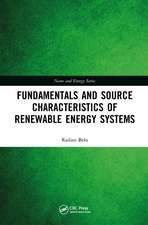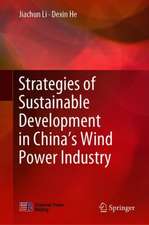Narratives of Low-Carbon Transitions: Understanding Risks and Uncertainties: Routledge Studies in Energy Transitions
Editat de Susanne Hanger-Kopp, Jenny Lieu, Alexandros Nikasen Limba Engleză Hardback – 4 mar 2019
This book examines the uncertainties underlying various strategies for a low-carbon future. Most prominently, such strategies relate to transitions in the energy sector, on both the supply and the demand side. At the same time they interact with other sectors, such as industrial production, transport, and building, and ultimately require new behaviour patterns at household and individual levels. Currently, much research is available on the effectiveness of these strategies but, in order to successfully implement comprehensive transition pathways, it is crucial not only to understand the benefits but also the risks.
Filling this gap, this volume provides an interdisciplinary, conceptual framework to assess risks and uncertainties associated with low-carbon policies and applies this consistently across 11 country cases from around the world, illustrating alternative transition pathways in various contexts. The cases are presented as narratives, drawing on stakeholder-driven research efforts. They showcase diverse empirical evidence reflecting the complex challenges to and potential negative consequences of such pathways. Together, they enable the reader to draw valuable lessons on the risks and uncertainties associated with choosing the envisaged transition pathways, as well as ways to manage the implementation of these pathways and ultimately enable sustainable and lasting social and environmental effects.
This book will be of great interest to students, scholars, and practitioners of environmental and energy policy, low-carbon transitions, renewable energy technologies, climate change action, and sustainability in general.
Preț: 1000.27 lei
Preț vechi: 1219.84 lei
-18% Nou
Puncte Express: 1500
Preț estimativ în valută:
191.43€ • 197.75$ • 159.31£
191.43€ • 197.75$ • 159.31£
Carte tipărită la comandă
Livrare economică 26 martie-09 aprilie
Preluare comenzi: 021 569.72.76
Specificații
ISBN-13: 9781138311589
ISBN-10: 1138311588
Pagini: 296
Ilustrații: 34 Line drawings, black and white; 8 Tables, black and white; 34 Illustrations, black and white
Dimensiuni: 156 x 234 x 18 mm
Greutate: 0.45 kg
Ediția:1
Editura: Taylor & Francis
Colecția Routledge
Seria Routledge Studies in Energy Transitions
Locul publicării:Oxford, United Kingdom
ISBN-10: 1138311588
Pagini: 296
Ilustrații: 34 Line drawings, black and white; 8 Tables, black and white; 34 Illustrations, black and white
Dimensiuni: 156 x 234 x 18 mm
Greutate: 0.45 kg
Ediția:1
Editura: Taylor & Francis
Colecția Routledge
Seria Routledge Studies in Energy Transitions
Locul publicării:Oxford, United Kingdom
Cuprins
List of figures
List of tables
Notes on contributors
Preface and acknowledgements
Part I: Setting the stage
1. Introduction
Susanne Hanger-Kopp, Jenny Lieu, and Alexandros Nikas
2. Framing risks and uncertainties associated with low-carbon pathways
Susanne Hanger-Kopp, Alexandros Nikas, Jenny Lieu
Part II: Pathways for incumbent large-scale technology systems
3. Austria: co-designing a low-carbon transition pathway focusing on energy supply for the iron and steel sector
Brigitte Wolkinger, Jakob Mayer, Andreas Tuerk, Gabriel Bachner, and Karl Steininger
4. Canada: finding common ground - the need for plural voices in lower-carbon futures of the Alberta oil sands
Luis D. Virla, Jenny Lieu, and Cecilia Fitzpatrick
5. United Kingdom: pathways towards a low-carbon electricity system – nuclear expansion versus nuclear phase out
Rocío Alvarez-Tinoco, Michele Stua, and Gordon MacKerron
Part III: Pathways towards renewable electricity systems
6. Chile: promoting renewable energy and the risk of energy poverty in Chile
Luis E. Gonzales Carrasco and Rodrigo Cerda
7. The Netherlands: expanding solar PV – risk and uncertainties associated with small- and large-scale options
Krisztina de Bruyn-Szendrei, Wytze van der Gaast, and Eise Spijker
8. Spain: on a rollercoaster of regulatory change - risks and uncertainties associated with a renewable energy transition
Alevgul H. Sorman, Cristina Pizarro-Irizar, Xaquín García-Muros, Mikel González-Eguino, and Iñaki Arto
9. Switzerland: risks associated with implementing a national energy strategy
Oscar van Vliet
Part IV: Pathways towards energy-efficient building sectors
10. China: risks and uncertainties in low-carbon pathways for the urban building sector
Lei Song, Jenny Lieu, and Ying Chen
11. Greece: from near-term actions to long-term pathways - risks and uncertainties associated with the national energy efficiency framework
Alexandros Nikas, Nikolaos Gkonis, Aikaterini Forouli, Eleftherios Siskos, Apostolos Arsenopoulos, Aikaterini Papapostolou, Eleni Kanellou, Charikleia Karakosta, and Haris Doukas
Part V: Pathways focusing on renewable energy technologies at household and community levels
12. Indonesia: risks and uncertainties associated with biogas for cooking and electricity
Mariana Silaen, Yudiandra Yuwono, Richard Taylor, Tahia Devisscher, Syamsidar Thamrin, Cynthia Ismail, and Takeshi Takama
13. Kenya: risks and uncertainties around low-carbon energy pathways
Oliver W. Johnson, Hannah Wanjiru, Mbeo Ogeya, and Francis X. Johnson
Part VI: Synthesis.
14. Transition pathways, risks, and uncertainties
Jenny Lieu, Susanne Hanger-Kopp, Wytze van der Gaast, Richard Taylor and Ed Dearnley
Afterword: key insights on averarching risks across transition pathways
Index
List of tables
Notes on contributors
Preface and acknowledgements
Part I: Setting the stage
1. Introduction
Susanne Hanger-Kopp, Jenny Lieu, and Alexandros Nikas
2. Framing risks and uncertainties associated with low-carbon pathways
Susanne Hanger-Kopp, Alexandros Nikas, Jenny Lieu
Part II: Pathways for incumbent large-scale technology systems
3. Austria: co-designing a low-carbon transition pathway focusing on energy supply for the iron and steel sector
Brigitte Wolkinger, Jakob Mayer, Andreas Tuerk, Gabriel Bachner, and Karl Steininger
4. Canada: finding common ground - the need for plural voices in lower-carbon futures of the Alberta oil sands
Luis D. Virla, Jenny Lieu, and Cecilia Fitzpatrick
5. United Kingdom: pathways towards a low-carbon electricity system – nuclear expansion versus nuclear phase out
Rocío Alvarez-Tinoco, Michele Stua, and Gordon MacKerron
Part III: Pathways towards renewable electricity systems
6. Chile: promoting renewable energy and the risk of energy poverty in Chile
Luis E. Gonzales Carrasco and Rodrigo Cerda
7. The Netherlands: expanding solar PV – risk and uncertainties associated with small- and large-scale options
Krisztina de Bruyn-Szendrei, Wytze van der Gaast, and Eise Spijker
8. Spain: on a rollercoaster of regulatory change - risks and uncertainties associated with a renewable energy transition
Alevgul H. Sorman, Cristina Pizarro-Irizar, Xaquín García-Muros, Mikel González-Eguino, and Iñaki Arto
9. Switzerland: risks associated with implementing a national energy strategy
Oscar van Vliet
Part IV: Pathways towards energy-efficient building sectors
10. China: risks and uncertainties in low-carbon pathways for the urban building sector
Lei Song, Jenny Lieu, and Ying Chen
11. Greece: from near-term actions to long-term pathways - risks and uncertainties associated with the national energy efficiency framework
Alexandros Nikas, Nikolaos Gkonis, Aikaterini Forouli, Eleftherios Siskos, Apostolos Arsenopoulos, Aikaterini Papapostolou, Eleni Kanellou, Charikleia Karakosta, and Haris Doukas
Part V: Pathways focusing on renewable energy technologies at household and community levels
12. Indonesia: risks and uncertainties associated with biogas for cooking and electricity
Mariana Silaen, Yudiandra Yuwono, Richard Taylor, Tahia Devisscher, Syamsidar Thamrin, Cynthia Ismail, and Takeshi Takama
13. Kenya: risks and uncertainties around low-carbon energy pathways
Oliver W. Johnson, Hannah Wanjiru, Mbeo Ogeya, and Francis X. Johnson
Part VI: Synthesis.
14. Transition pathways, risks, and uncertainties
Jenny Lieu, Susanne Hanger-Kopp, Wytze van der Gaast, Richard Taylor and Ed Dearnley
Afterword: key insights on averarching risks across transition pathways
Index
Notă biografică
Susanne Hanger-Kopp is a researcher at the Institute for Environmental Decisions at ETH Zürich, Switzerland, and at the Risk and Resilience Program of the International Institute for Applied Systems Analysis in Laxenburg, Austria.
Jenny Lieu is a research fellow at the University of Sussex, UK, and guest researcher at the Transdisciplinary Lap of the Department of Environmental Systems Science at ETH Zürich, Switzerland.
Alexandros Nikas is a researcher at the Management & Decision Support Systems Laboratory of the School of Electrical and Computer Engineering, National Technical University of Athens, Greece.
Jenny Lieu is a research fellow at the University of Sussex, UK, and guest researcher at the Transdisciplinary Lap of the Department of Environmental Systems Science at ETH Zürich, Switzerland.
Alexandros Nikas is a researcher at the Management & Decision Support Systems Laboratory of the School of Electrical and Computer Engineering, National Technical University of Athens, Greece.
Descriere
This book presents empirical evidence reflecting the complex challenges and potential consequences of low-carbon pathways, enabling us to draw valuable lessons on the risks and uncertainties we face in choosing these pathways, as well as ways to manage them and ultimately enable their sustainable and lasting social and environmental effects.





































